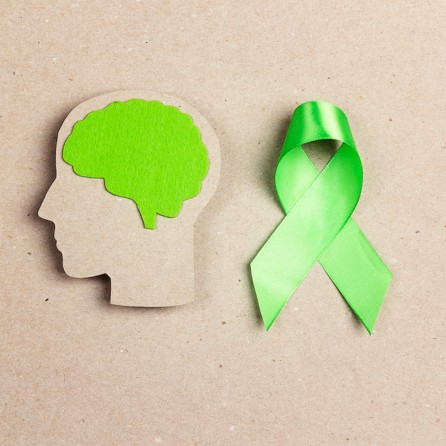
This year's Mental Health Day theme is 'mental health for all' and here at OMS we couldn't agree with that statement more.
Receiving a diagnosis and living with MS can mean you also experience mental health conditions, and living with these alongside MS can be a challenge.
For people with MS, depression is the single most important factor affecting quality of life – even more so than disability or fatigue. Another common MS symptom can be anxiety. Stress and anxious feelings can affect the body’s ability to fight disease, so it’s important to learn ways of managing anxiety levels as much as possible.
So to mark Mental Health Day, 10th October, we asked two OMSers to share their experiences of mental health and explain how it has affected them and coping strategies they have in place.
For World Mental Health Day, I want to acknowledge how much therapy has helped me accept my MS diagnosis and anxiety.
I believe the two biggest ways I have cared for myself after my diagnosis are following the OMS lifestyle and seeing a therapist regularly.
I knew when I started looking for a counsellor, I needed them to have at least some understanding of chronic conditions. I was lucky to find someone quickly who met all my criteria (able to meet remotely, covered by my insurance, supportive of LGBTQ people) and had similar personal experience.
With her help, I have found numerous ways of reducing stress and negative thoughts everyday. Like many important things in life, therapy is a marathon not a sprint.
I know I still have a lot to work through, but feel comforted knowing I’ll receive help along the way.
In my late forties, my life began to unravel. It began slowly: a dropped stitch, a small hole then row after row coming apart.
It was a difficult time with children leaving home and a parent ailing. Life was filled with stress and the strain eventually took its toll on my mental health.
Not wanting to compromise my thinking ability, I refused medication and sought other forms of relief. I was given cognitive behavioural therapy (CBT) via telephone – useful but not perfect. I started meditation classes.
The one thing that always helped was my regular games of outdoor tennis, walking and cycling.
Then my back gave up and so began three years of pain, tests and confusion.
I went from an active, confident person to one for whom every task became filled with anxiety. As the MS accelerated and no-one could work out what was wrong, I began to wonder if it was all in my head.
When I was finally diagnosed following a very serious relapse, I was relieved. I was not mad; I was ill.
Learning you have MS is a frightening experience. Fortunately, a friend introduced me to OMS early on and gave me hope.
I read extensively. And one key idea kept emerging: we must care for our minds if we hope to remain well in the body. Stress had certainly precipitated the onset of the condition, so perhaps learning to deal with stress would help me cope and even heal.
I sought a counsellor. She was brilliant and wise. Over the weeks, she helped me clear all the mental clutter and to start again afresh and unafraid.
The next step was to take up serious meditation practice and mindfulness. I found Jon Kabat-Zinn’s writing and CDs immensely useful – and he too advised having psychological support to hand if doing meditation intensively.
Stitch by stitch, I was rebuilding my life. I’d drop a few, but now I knew how to pick them back up. My physical health was improving; my mental health was better than ever. Life was not perfect. It never is. Yet, now I was able to deal with its trials with greater serenity.
I wish you well on your journey. Be kind to yourself. Invest in whatever will make your mental health better. And always remember that you are worth it.
Wow what a topic and one difficult to deal with. And perhaps therein has been the issue. The repression and denial and stuffing down seems to have made things harder. And so this weird cycle of feeling down began because a suspicion lurked at the back of my mind that somehow I had contributed to this. Yet I didn’t want to deal with that suspicion. That’s ridiculous I said. But the feeling went unacknowledged, and unexpressed like so many other ones. And there started the negative spiral down. I felt entangled in a complicated emotional web.
I have started journaling my thoughts and feelings a few months ago. And suddenly these feelings have a voice, no longer stuffed down. It doesn’t matter that I don’t share the writings with anyone, destroying the pages that I have written. Just giving the feelings a voice on the page helps. I have broken the strands of the web.
I set a timer then write for at least 15 minutes. Sometimes the timer goes off and I want to keep going. Other times, it is hard to get to the timer bell. I have found that if I skip too many days of journaling both my mind and body know it.
Please remember that you are never alone and remember the importance of talking to someone.
If you do not feel like you have anyone to talk to please try contacting one of the numbers below:
Australia:
Lifeline – 131114
Samaritans – 135247
Canada:
Crisis Services Canada – 18334564566
France:
Suicide Ecoute – 0033 145 39 4000
Germany:
Telefonseelsorge Deutschland – 0800 -111 0 222
Italy:
Samaritans – 800 86 00 22
New Zealand:
Lifeline New Zealand – 0800543354
South Africa:
Lifeline Southern Africa – 0861 322 322
USA:
Mental Health America – 1 800 273 8255
UK and RoI:
Samaritans – 116 123